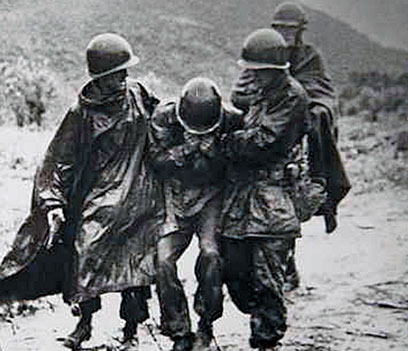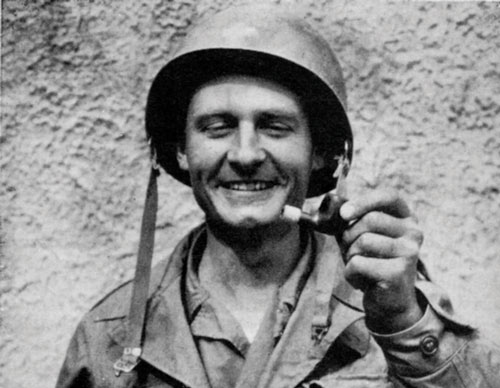The Ordeal of Chaplain Kapaun
An excerpt from the 1954 Saturday Evening Post story that first shared Father Kapaun’s story with the world
By Mike Dowe 5/1/2023
Father Kapaun (right) and Capt. Jerome A. Dolan, a medical officer with the 8th Cavalry Regiment, help an exhausted soldier off the battlefield in Korea, early in the war. Universal History Archive/Universal Images Group via Getty Images
EDITOR’S NOTE: The following text is abridged from an article by 1st Lt. Ray “Mike” Dowe, as told to Harold H. Martin, that originally appeared in the Jan. 16, 1954, issue of The Saturday Evening Post. Captured during the Battle of Unsan in November 1950, Dowe and Father Emil Kapaun spent six months together in a Chinese-run prison camp in North Korea until the chaplain’s death on May 23, 1951. Dowe endured two more years as a POW before he was released Sept. 6, 1953. For the next six decades, he championed Father Kapaun as a candidate for the Medal of Honor, which the chaplain was posthumously awarded April 11, 2013. Dowe joined the Knights of Columbus in 1960; a retired Army colonel and nuclear physicist, he is now 95 years old and a member of St. Ignatius Loyola Council 10861 in Spring, Texas.
He wore the cross of the Chaplain b ranch instead of the crossed rifles of the infantry, but he was, I think, the best foot soldier I ever knew, and the bravest man, and the kindest. His name was Emil Joseph Kapaun, and he was a priest of the Roman Catholic Church. But the men he served in the prison camps of Korea didn’t care whether he was Catholic or Baptist, Lutheran or Presbyterian. To all of them, Catholic, Protestant and Jew alike, and to men who professed no formal faith at all, he was simply “Father,” and each of them, when trouble came, drew courage and hope and strength from him. …
ranch instead of the crossed rifles of the infantry, but he was, I think, the best foot soldier I ever knew, and the bravest man, and the kindest. His name was Emil Joseph Kapaun, and he was a priest of the Roman Catholic Church. But the men he served in the prison camps of Korea didn’t care whether he was Catholic or Baptist, Lutheran or Presbyterian. To all of them, Catholic, Protestant and Jew alike, and to men who professed no formal faith at all, he was simply “Father,” and each of them, when trouble came, drew courage and hope and strength from him. …
In his religious services, which he doggedly held even though the Chinese threatened him, his brief sermons were deep, but every point he made struck home. … Because of those sermons, which gave us hope and courage, and because of the food he stole for us and the care he gave us when we were sick, many of us came back who never would have survived our long ordeal without him.
He had become a legend among the troops long before the Chinese captured him. … He seemed to have no fear that he himself might be killed. At Kumchon early in the war, when word came back that there was a wounded man on the left flank of the first battalion, in a position so exposed that the litter men could not reach him, Father and another officer went after him and brought him back, crawling and ducking from rock to rock through fire so thick his pipe was shot out of his mouth.
It was his devotion to the wounded which finally cost him his freedom, and his life. It was at Unsan, on the second of November in 1950. … At dusk, the order came for every man who could still walk to try a breakout through the surrounding enemy. Father, who was unwounded, might have escaped with them. He refused to go. Of his own free will he stayed on, helping Captain Clarence L. Anderson, the regimental surgeon, take care of the wounded. And there, just at dark, the Chinese took him as he said the last prayers over a dying man….
THE SICK HOUSE
Soon after we reached the valley, the wounded in the sick house — the Chinese called it the hospital — began to die by dozens, poisoned by their untended wounds. … Then began Father’s most hazardous exploits. On days when there was a ration run, he’d stop and steal food at the warehouse. Then with his pockets full of cracked corn, or millet, dodging the Chinese roving patrols that watched the trail, he’d move on to the house where the wounded were. …
He scrounged cotton undershirts to make bandages. He took their old bandages, foul with corruption, and sneaked them out and washed them and sneaked them back again. He picked the lice from their bodies, an inestimable service, for a man so weak he cannot pick his own lice soon will die. He let them smoke his pipe, loaded with dry cotton leaves, and he joked with them, and said prayers for them, and held them in his arms like children as delirium came upon them.
But the main thing he did for them was to put into their hearts the will to live. For when you are wounded and sick and starving, it’s easy to give up and quietly die. …
Chaplain Emil Kapaun smiles as he holds up a pipe broken by a sniper’s bullet. Photo by Army Col. Raymond Skeehan
In his soiled and ragged fatigues, with his scraggly beard and his odd-looking woolen cap made of the sleeve of an old GI sweater, pulled down over his ears, he looked like any other half-starved prisoner.
But there was something in his voice and bearing that was different — a dignity, a composure, a serenity that radiated from him like a light. Wherever he stood was holy ground, and the spirit within him — a spirit of reverence and abiding faith — went out to the silent, listening men and gave them hope and courage and a sense of peace. By his very presence, somehow, he could turn a stinking, louse-ridden mud hut, for a little while, into a cathedral. …
As our bodies weakened, the Reds stepped up the pace of their propaganda assault upon our minds. Hour after hour we sat in lectures…. Without losing his temper or raising his voice, [Father would] answer the lecturer point by point, with a calm logic that set [the lecturer] screaming and leaping on the platform like an angry ape. Strangely, they never punished him, except by threats and ominous warnings. …
We realized then what we had half known all along. They were afraid of him. They recognized in him a strength they could not break, a spirit they could not quell. …
EASTER CHALLENGE
On Easter Sunday, 1951, he hurled at them his boldest challenge, openly flouting their law against religious services. In the yard of a burned-out church in the officers’ compound, just at sunrise, he read the Easter service. …
He fashioned a cross out of two rough pieces of wood, and from a borrowed missal he read the Stations of the Cross to the scarecrow men, sitting on the rubbled steps of the burned church. He told the story of Christ’s suffering and death, and then, holding in his hands a Rosary made of bent barbed wire cut from the prison fence, he recited the Glorious Mysteries of Christ risen from the tomb and ascended into heaven.
As we watched him it was clear to us that Father himself at last had begun to fail in strength. On the starvation diet we were allowed, a man could not miss a single day’s meals without growing too weak to walk, and for months Father had been sharing his meager rations with sick and dying men.
The week after Easter he began to limp, hobbling along on a crooked stick. … Then a fearful dysentery seized him, and as he so often had done for us, we cared for him as best we could. …
But the Chinese did not intend that he should live. He was sitting up, eating and cracking jokes, when the guards came with a litter to take him to the hospital. We knew then that he was doomed….
Father himself made no protest. He looked around the room at all of us standing there, and smiled. He held in his hands the pyx in which, long ago, he had carried the Blessed Sacrament. “Tell them back home that I died a happy death,” he said, and smiled again. …
Then he turned to me. “Don’t take it hard, Mike,” he said. “I’m going where I’ve always wanted to go. And when I get up there, I’ll say a prayer for all of you.” …
A year later, on the anniversary of his death, Ralph Nardella asked the communists for permission to hold a service in his memory. They refused. I was glad they did. For it told me that even though he was dead, his body lost forever in a mass grave, they still were afraid of him. They feared him because he was the symbol of something they knew they could not kill — the unconquerable spirit of a free man, owning final allegiance only to his God. And in that sense, I know, he and the things he believed in can never die.
Source of Full Article